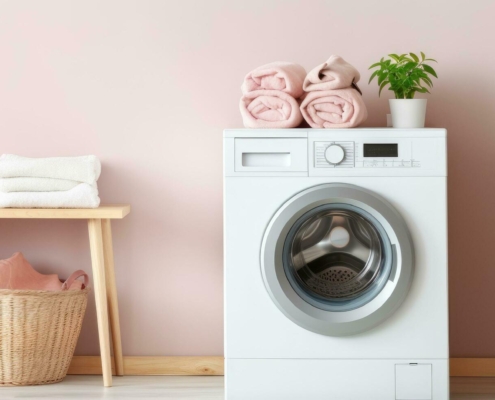When to Repair vs. Replace Your Washing Machine
 Is your washing machine starting to show signs of wear and tear? Are you wondering if it’s time to repair or replace it? Knowing when to repair or replace your washing machine can save you time, money, and frustration. In this guide, we’ll discuss the factors you should consider before making a decision.
Is your washing machine starting to show signs of wear and tear? Are you wondering if it’s time to repair or replace it? Knowing when to repair or replace your washing machine can save you time, money, and frustration. In this guide, we’ll discuss the factors you should consider before making a decision.
Jump to article sections:
- Understanding the Lifespan of Washing Machines
- Signs that Your Washing Machine Needs Repair
- Factors to Consider When Deciding Between Repair or Replacement
- Cost Analysis: Repairing vs. Replacing
- Energy Efficiency Considerations
- When to Replace Your Washing Machine
- When to Repair Your Washing Machine
- Manufacturer’s Warranty and Repair Services
1. Understanding the Lifespan of Washing Machines
Washing machines are an essential appliance in any household, and they’re designed to last for many years. However, like all appliances, they have a limited lifespan. On average, a washing machine can last anywhere between 8-12 years with proper maintenance and usage.
2. Signs that Your Washing Machine Needs Repair
Before deciding whether to repair or replace your washing machine, it’s important to determine if a simple fix is all it needs. Here are some common signs that your washing machine may need repair:
- It’s not spinning properly: If your clothes are still soaking wet after going through a spin cycle, there may be an issue with the motor or belts.
- It’s making strange noises: Loud banging, squealing, or grinding noises could indicate a problem with the bearings, drum, or other internal components.
- It’s leaking water: If you find puddles of water around your washing machine, there may be a leak in the hoses, pump, or tub.
- It’s not filling up with water: This could be due to a faulty water inlet valve or clogged filters.
- The cycles aren’t completing: If your washing machine keeps stopping mid-cycle or won’t finish a cycle at all, it could be an issue with the timer or control panel.
If you notice any of these signs, it’s best to have a professional inspect your washing machine to determine the cause and whether it can be repaired.
3. Factors to Consider When Deciding Between Repair or Replacement
Once you’ve determined that your washing machine needs attention, it’s time to decide whether to repair or replace it. Here are some factors you should consider before making a decision:
- Age of the washing machine: Most washing machines have a lifespan of around 10 years. If your machine is approaching this age, it may be more cost-effective in the long run to replace it rather than continuously repairing it.
- Cost of repairs: If the cost of repairs is less than 50% of the cost of a new washing machine, then repairing may be a more viable option.
- Frequency of repairs: If your washing machine has been breaking down frequently and requiring expensive repairs, it may be time to consider replacing it rather than continuously pouring money into it.
- Availability of parts: Depending on the make and model of your washing machine, certain parts may be difficult or even impossible to find. This could make repairing a challenge or significantly increase the cost.
4. Cost Analysis: Repairing vs. Replacing
The cost of repairs and replacement can vary significantly depending on the type, make, and model of your washing machine. In general, however, here’s a basic breakdown of costs:
- Repairing: Depending on the issue, repairing a washing machine can cost anywhere from $50 to $500 or more.
- Replacing: The average cost for a new washing machine ranges from $400 to $1000. High-end models can even go up to $2000 or more.
When asking yourself “Is my washing machine worth the cost of repair?” consider the age and frequency of repairs, as well as the potential energy savings of a new machine.
5. Energy Efficiency Considerations
Aside from cost, another important factor to consider when deciding between repairing or replacing your washing machine is energy efficiency. Older machines tend to use more water and electricity, which can add up on your utility bills over time. In contrast, newer models are designed to be more energy-efficient, using less water and electricity per load.
Replacing an old washing machine with a new, energy-efficient model can not only save you money on your utility bills but also have a positive impact on the environment. According to the U.S. Department of Energy, replacing an old top-loading washer with a new ENERGY STAR certified one can save 3,000 gallons of water per year.
6. When to Replace Your Washing Machine
There are certain cases where it’s best to replace your washing machine rather than repairing it. Some examples include:
- Extensive damage: If your washing machine has suffered from extensive physical damage, such as a broken drum or motor, repairing it may not be possible.
- Safety concerns: If you notice any electrical issues, like sparks or smoke coming from the machine, it’s best to replace it for safety reasons.
- Outdated technology: If your washing machine is outdated and doesn’t have the same features and capabilities as newer models, replacing it can improve efficiency and performance.
7. When to Repair Your Washing Machine
 On the other hand, there are times when a simple washer repair can extend the life of your washing machine without breaking the bank. Here are some situations where repairing may be a better option:
On the other hand, there are times when a simple washer repair can extend the life of your washing machine without breaking the bank. Here are some situations where repairing may be a better option:
- Minor issues: If the problem with your washing machine is minor and can be quickly fixed, it may not make sense to replace it.
- Still under warranty: If your washing machine is still under warranty, repairs may be covered, saving you the cost of replacement.
There also may be an issue minor enough where you can do a DIY repair, saving you even more money. Read our guide “4 Common Washer Issues and How to Solve Them.” However, it’s important to be cautious when attempting DIY repairs and always consult a professional if unsure.
8. Manufacturer’s Warranty and Repair Services
If your washing machine is still under manufacturer’s warranty, it’s important to contact them and inquire about their repair services. They may offer free or discounted repairs as part of the warranty.
For an appliance repair service in the Atlanta area, trust Comfort Appliance Repair. Comfort Appliance Repair services washing machines of all makes and models, providing reliable and affordable repairs. Contact us today to schedule your washing machine repair or to discuss replacement options with our knowledgeable team.
By Dennis Godynuk, Owner of Comfort Appliance Repair
Dennis Godynuk is the owner of Comfort Appliance Repair in Covington, GA. Comfort Appliance provides fast and reliable repair services for all major household appliances. Dennis and his team of experienced technicians can tackle any problem, from broken refrigerators to malfunctioning dishwashers, and their prices are very competitive. Customers can rest easy knowing that their appliances are in good hands when they call Comfort Appliance Repair.



